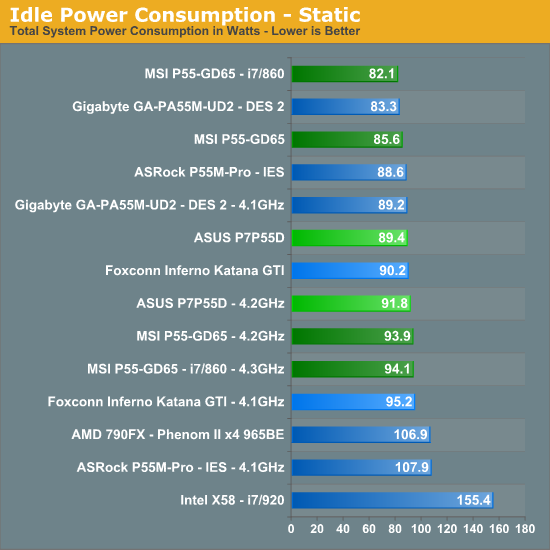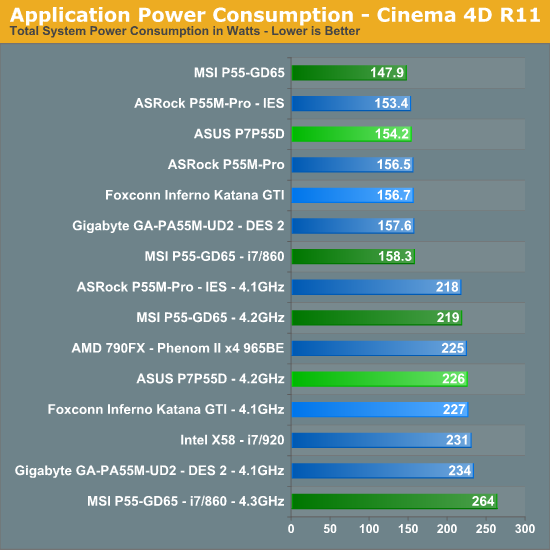MSI P55-GD65 - Mid-Range P55 for the Masses
by Gary Key on October 10, 2009 12:00 PM EST- Posted in
- Motherboards
There's really no other way to say this: MSI’s P55-GD65 performs almost exactly the same as any other P55 motherboard in every single benchmark we ran.
Application tests, game tests, LAN tests, even USB, Firewire, and SATA controller performance was virtually identical across the board. We've known for a while now that motherboards of a given generation all perform the same, but there's honestly no more to it than that.
We've included a wealth of application, gaming and peripheral performance data for you to see for yourself, but honestly, features, overclocking potential, support, and price point are what matter here.
The biggest difference between the boards, from a performance standpoint, actually surfaces in power consumption:

At idle the MSI P55-GD65 draws the least amount of power with the Core i7/860, while the Core i5/750 draws right over 2W more than the micro-ATX based Gigabyte board. Why the 860 setup draws less power is something we are still working on, but even manually setting the voltages the same resulted in a similar 2W~3W difference. When the 750 is overclocked, it draws slightly more power than the ASUS P7P55D board which features a voltage offset option in the BIOS, allowing it to idle at 1.088V instead of the 1.352V on the MSI board. The load numbers favor the MSI board across the board.

Application/Gaming Performance
We're presenting all of the application/gaming performance data without commentary because, as we mentioned before - there's no real appreciable performance difference between these three boards. All of the boards were run with the Core i5 750 and we've included the Phenom II X4 965 BE as well as the i7 860, 870 and 920 purely for reference. Please check our Lynnfield launch article to see how well this processor performs against a variety of CPUs.
In many of our tests, the Core i5 750 is the same speed or faster than the Phenom II X4 965 BE. The lack of Hyper Threading prevents it from being a runaway success. In other cases, the Phenom II X4 965 is faster - and by a large degree.
Intel was very careful to disable HT on the 750, without it, there would be no reason to spend the extra money on the Core i7 860. Just as it was with Bloomfield, $284 is the sweet spot for Lynnfield if absolute performance is a requirement. Now for the benchmarks.










43 Comments
View All Comments
yacoub - Saturday, October 10, 2009 - link
Did I miss the list of PSUs that OCGenie had conflicts with? That would be important and helpful data to have in the article and I couldn't find it.Also, this board could be a winner if it didn't have so many archaic parts, like IDE and floppy. Really, MSI, drop those already! Even though there's probably no actual downside to having those items on the board, it actually does make me think less of it and discourage me from considering it. That plus the PSU and BIOS issues keep this from being my first choice.
Eagerly awaiting the other upcoming reviews. :)
michaelheath - Saturday, October 10, 2009 - link
On the first page, issues with Channel Well power supplies and OC Genie were mentioned as being a commonality between the GD65 and the GD80. What would be nice is if Gary would clue us in as to what particular models were giving him grief. Is it CWT's older designs? Is it newer DC-DC designed power supplies?The quagmire comes from the mention of Channel Well, Antec, BFG, and Corsair in the beginning of the article. Channel Well makes some Corsair power supplies, but BFG and Antec haven't used CWT recently for any of their power supplies.
Perhaps someone could clear the air, because I was planning on buying a high efficiency power supply with an MSI P55 board in the near future.
yacoub - Saturday, October 10, 2009 - link
Right. In particular, I am curious if the modular Corsair PSUs, which are a personal favorite, are on the list. The HX520W and HX620W, for examples.punjabiplaya - Monday, October 12, 2009 - link
Using an HX620 with my gd65 right now. works perfectly fine.michaelheath - Saturday, October 10, 2009 - link
...and when I said "Antec" I meant "Thermaltake", which has used CWT for many of their ToughPower units. My bad.punjabiplaya - Saturday, October 10, 2009 - link
I bought this board with a i5 750 and it's been rock solid. Noticeably quicker boot times than my old q6600/680i setup. The only problem I have is with the memory/XMP settings. I'm using a G-skill ddr3 2000 kit. When I set it to auto it shows the memory at being 1600MHz. When I reset and/or boot, it's set at 1333. However, if i set it to advanced or w/e the other setting is, it works and sets the memory at 2000MHz. Other than that, really good board and exceptional value for the price.punjabiplaya - Saturday, October 10, 2009 - link
I bought this board with a i5 750 and it's been rock solid. Noticeably quicker boot times than my old q6600/680i setup. The only problem I have is with the memory/XMP settings. I'm using a G-skill ddr3 2000 kit. When I set it to auto it shows the memory at being 1600MHz. When I reset and/or boot, it's set at 1333. However, if i set it to advanced or w/e the other setting is, it works and sets the memory at 2000MHz. Other than that, really good board and exceptional value for the price.goinginstyle - Saturday, October 10, 2009 - link
Just wanted to say that I really like the new way you are introducing the motherboard articles with the results and conclusions right up front. This article and the mATX were really good.MadMan007 - Sunday, October 11, 2009 - link
Yeah it keeps me from just jumping to the conclusion page then back to read the rest of the article if I want to. Well done.jigglywiggly - Saturday, October 10, 2009 - link
Where be the conclusion